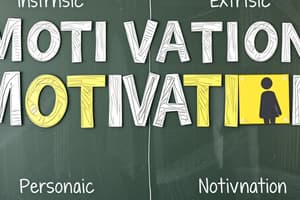Podcast
Questions and Answers
What is the difference between extrinsic and intrinsic motivation?
What is the difference between extrinsic and intrinsic motivation?
Extrinsic motivation refers to engaging in activities to reduce needs or obtain external rewards, while intrinsic motivation refers to engaging in activities because those activities are personally rewarding.
Compare and contrast two theories of motivation using a diagram.
Compare and contrast two theories of motivation using a diagram.
Incentive Theory stresses the role of the environment in motivating behavior, while Drive-Reduction Theory emphasizes the internal states of the organism.
Give an example of a fixed action pattern and explain why fixed action patterns are unable to explain motivation adequately.
Give an example of a fixed action pattern and explain why fixed action patterns are unable to explain motivation adequately.
Which theory of motivation might best explain why you work to get good grades?
Which theory of motivation might best explain why you work to get good grades?
When you are motivated, what three things are true?
When you are motivated, what three things are true?
What is homeostasis and how does it affect behavior?
What is homeostasis and how does it affect behavior?
How does the hypothalamus help determine whether you will eat or not?
How does the hypothalamus help determine whether you will eat or not?
What did Schachter conclude about the differences between overweight and normal-weight people?
What did Schachter conclude about the differences between overweight and normal-weight people?
What is the difference between a need and a drive?
What is the difference between a need and a drive?
What is the motive to avoid success?
What is the motive to avoid success?
According to the Yerkes-Dodson law, what level of arousal would help you do well on an exam?
According to the Yerkes-Dodson law, what level of arousal would help you do well on an exam?
Why do people who are motivated by the fear of failure not perform as well as those motivated by the need for achievement?
Why do people who are motivated by the fear of failure not perform as well as those motivated by the need for achievement?
Draw Maslow's Hierarchy of Needs.
Draw Maslow's Hierarchy of Needs.
Into what category in the hierarchy do biological needs fall?
Into what category in the hierarchy do biological needs fall?
Describe how fundamental, psychological, and self-actualization needs differ.
Describe how fundamental, psychological, and self-actualization needs differ.
List four motives associated with hunger.
List four motives associated with hunger.
What is the difference between the expectancy-value theory and the competency theory?
What is the difference between the expectancy-value theory and the competency theory?
What strategies would you offer to a friend who wanted to increase his or her need for achievement?
What strategies would you offer to a friend who wanted to increase his or her need for achievement?
How does the Cannon-Bard theory differ from the James-Lange theory?
How does the Cannon-Bard theory differ from the James-Lange theory?
According to Schachter, what role does the environment play in the emotions you experience?
According to Schachter, what role does the environment play in the emotions you experience?
What causes the emotion in each theory?
What causes the emotion in each theory?
According to the opponent-process theory, what happens when the stimulus for one emotion is removed after repeated experience?
According to the opponent-process theory, what happens when the stimulus for one emotion is removed after repeated experience?
What are the three parts of an emotion?
What are the three parts of an emotion?
Use a flow-chart to describe how the opponent-process theory works.
Use a flow-chart to describe how the opponent-process theory works.
What does it mean when psychologists say that certain facial expressions are innate?
What does it mean when psychologists say that certain facial expressions are innate?
According to the James-Lange theory, which came first—the fright or the trembling? According to Schachter and Singer's theory, which came first?
According to the James-Lange theory, which came first—the fright or the trembling? According to Schachter and Singer's theory, which came first?
Flashcards are hidden until you start studying
Study Notes
Motivation Concepts
- Extrinsic Motivation: Engaging in activities for external rewards or to meet needs.
- Intrinsic Motivation: Engaging in activities for personal satisfaction and to fulfill internal beliefs.
- Incentive Theory: Emphasizes environmental factors as motivators, including reinforcers, goals, and rewards.
- Drive-Reduction Theory: Focuses on internal states driving behavior to satisfy needs.
Fixed Action Patterns
- Example: Specific behaviors triggered by certain stimuli, like nesting behavior in birds.
- Limitations: Fixed action patterns do not account for variability in motivation and context-dependent behavior.
Theories of Motivation for Academic Performance
- Different motivational theories can explain student efforts to achieve good grades; personal goals, rewards, and beliefs influence the motivation to work or not.
Characteristics of Motivation
- Motivated individuals feel energized, focus on goals, and experience varying emotional intensities regarding goal achievement.
Homeostasis
- Definition: A balanced internal state maintained by the body.
- Behavioral Impact: Drives behaviors that restore balance when physiological needs are unmet.
Hypothalamus Role in Eating
- Regulates hunger by responding to hormonal signals and energy levels, influencing when and what we eat.
Weight Differences in Motivation
- Schachter's conclusion: Overweight individuals may have variations in sensitivity to internal cues, affecting their eating behaviors compared to normal-weight individuals.
Needs vs. Drives
- Need: A deficiency state, either biological or social.
- Drive: A psychological impulse motivating behavior to fulfill needs.
Avoidance of Success
- Motive: Fear of failure or pressure to perform can lead individuals to avoid success.
Yerkes-Dodson Law
- Optimal arousal levels for performance vary depending on task complexity; moderate arousal is best for exam performance.
Fear of Failure vs. Need for Achievement
- Individuals motivated by fear of failure may focus on avoiding negative outcomes rather than striving for success, leading to lower performance.
Maslow's Hierarchy of Needs
- Depicts a pyramid of needs, starting with physiological needs at the base and advancing to self-actualization at the peak.
Biological Needs in Hierarchy
- Fall within the foundational level of Maslow's Hierarchy, essential for survival.
Differentiating Needs
- Fundamental Needs: Basic survival requirements (e.g., food, water).
- Psychological Needs: Social relationships and esteem.
- Self-Actualization Needs: Personal growth and fulfillment.
Motivations Associated with Hunger
- Biological drives, social influences, learned behaviors, and environmental cues are motives linked to hunger.
Expectancy-Value Theory vs. Competency Theory
- Expectancy-Value Theory: Beliefs about outcomes and values of goals affect motivation.
- Competency Theory: Motivation is influenced by the desire to demonstrate skills and abilities.
Increasing Achievement Motivation
- Strategies include setting challenging yet attainable goals, seeking feedback, and rewarding efforts to boost personal achievement drive.
Cannon-Bard vs. James-Lange Theory
- Cannon-Bard: Emotion and physiological responses occur simultaneously.
- James-Lange: Emotions result from physiological reactions to stimuli.
Environmental Influence on Emotions
- Schachter posited that environmental contexts shape emotional experiences and responses.
Emotional Process in Theories
- Different theories attribute emotion generation to distinct processes, such as physiological response or cognitive appraisal.
Opponent-Process Theory
- Postulates that repeated experiences of an emotion result in a diminishing initial emotion and an intensified opposing emotion upon removal of the stimulus.
Components of Emotion
- Emotional experiences entail physiological responses, expressive behaviors, and cognitive evaluations.
Flow-Chart of Opponent-Process Theory
- Suggests that an initial emotional response leads to the development of an opposite reaction over time.
Innate Facial Expressions
- Certain facial expressions are seen as biologically inherited rather than learned, suggesting a universal language of emotions.
Fright and Trembling Sequence
- James-Lange Theory: Trembling precedes the feeling of fright.
- Schachter-Singer Theory: Both physiological response and cognitive labels contribute to the experience and can shift in order depending on context.
Studying That Suits You
Use AI to generate personalized quizzes and flashcards to suit your learning preferences.



